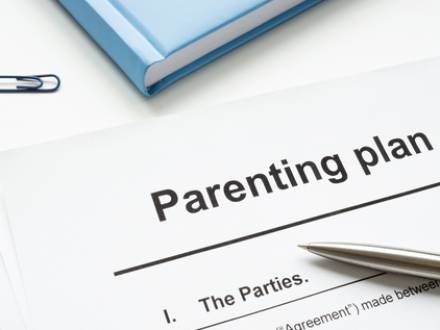The Importance of Creating a Workable Parenting Plan
 Divorce is rarely easy, and when there are children, it tends to be even more difficult. Divorcing parents must – either separately or jointly – file a proposed parenting plan within 120 days after the petition for allocation of parental responsibilities is filed. Under 750 ILCS 5/602.10(f), proposed parenting plans must address 15 specific issues and can address additional issues. If either or both parents do not file a parenting plan with the court, a hearing will be held, and the court will allocate parental responsibilities.
Divorce is rarely easy, and when there are children, it tends to be even more difficult. Divorcing parents must – either separately or jointly – file a proposed parenting plan within 120 days after the petition for allocation of parental responsibilities is filed. Under 750 ILCS 5/602.10(f), proposed parenting plans must address 15 specific issues and can address additional issues. If either or both parents do not file a parenting plan with the court, a hearing will be held, and the court will allocate parental responsibilities.
The court may also require the parents to attend mediation. The court is only interested in whether a proposed parenting plan reflects the child’s best interests. Courts usually believe joint custody is in the child’s best interests when determining the allocation of parental responsibilities and parenting time. This means parenting time is divided, but not necessarily equally. Many parents who have joint custody have a 2-2-3 plan, which allows the child to be with the first parent for two days, the other parent for two days, then the first parent for three days.
Since this schedule rotates, each parent has roughly the same amount of time with the child. Granting one parent sole custody is rare unless one parent has serious issues that could jeopardize the child's safety. If you have questions regarding the allocation of parental responsibilities, parenting time, or a parenting plan, an experienced Bloomingdale, IL parental responsibilities attorney can help.
Factors That Affect a Parenting Plan
When putting a parenting plan together, the parents must consider the distance between the parent’s homes, how close each home is to the child’s school, friends, after-school activities, daycare, and doctors, and the work schedules of each parent. Parents may also consider adding a "right of first refusal" to the parenting plan, which means each parent must offer the other parent the chance to care for the child if they are unable to do so during his or her scheduled time. This right of first refusal will include the types of situations it applies to, how the other parent will be notified, and how transportation for the child will be handled.
Creating a Parenting Plan
When creating a parenting plan, you must first decide on a parenting schedule that works for the child, ensures both parents have quality time with the child, and considers the schedules of the child and both parents. The parenting plan must also address communication between the parents, and between the child and the parent he or she is not with. Emails, texts, video apps, and co-parenting apps can facilitate communication.
It must be decided whether both parents will jointly make big decisions for the child, including those associated with the child’s education, religion, health, and extracurricular activities. If there are likely to be disputes regarding these issues, a dispute resolution process should be outlined in the parenting plan. The specifics of child support and what expenses it covers, as well as the timeline for payments, should be addressed in the parenting plan, along with how to manage unexpected expenses.
Pickups and drop-offs – times and methods of exchange – are also a crucial part of a parenting plan, as are how holidays, birthdays, and summer vacations will be shared. Depending on your specific situation, you may also want to include the following in your parenting plan:
- Language that addresses the use of children as "messengers" or "go-betweens" and discusses negative comments made by one parent about the other.
- The level of contact a child is allowed to have with specific third parties, including new romantic relationships of each parent.
- Whether notice is required before a parent can take the child out of state or out of the country
- How a move on the part of one parent will be handled
- The child’s use of electronic devices
Contact a DuPage County, IL Parental Responsibilities Lawyer
Creating a parenting plan can become much easier when you have a skilled Naperville, IL parental responsibilities attorney from Mevorah & Giglio Law Offices. Our firm’s attorneys have more than 175 years of combined experience. We provide highly client-focused service that includes frequent communication. Call 630-932-9100 to schedule your free consultation.
 English,
English,
 Spanish,
Spanish,
 Polish,
Polish,
 Urdu
Urdu













 Make a Payment
Make a Payment



